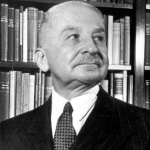1. Herbert Spencer
Recommended reading: Social Statics
A polymath, Herbert Spencer was originally known for his writing on biology. He coined the phrase “survival of the fittest,” used to describe the process of natural selection. Spencer rose to prominence by extending the lessons of biological evolution to politics and sociology.Libertarian historian Brian Doherty writes in his tome Radicals for Capitalism that libertarian political theorist Murray Rothbard once described Spencer’s work Social Statics as “the greatest single work of libertarian political philosophy ever written.” In Social Statics, Spencer writes that one has a moral obligation to support charities, considering them “the highest forms of social evolution.” Spencer was ahead of his time in other ways as well, self-identifying as a “radical feminist” advocating for “complete suffrage” and a “right to ignore the state.”
2. Benjamin Tucker
Recommended reading: Individual Liberty
Benjamin Tucker was a 19th century American writer, editor, and publisher, and a self-proclaimed “individualist anarchist”. Tucker is probably best known for his periodical plainly titled Liberty, which ran for nearly 30 years. Feminist thinker Wendy McElroy would go on to describe Liberty as “widely considered to be the finest individualist-anarchist periodical ever issued in the English language.”Liberty would eventually showcase the writings of some of the most influential political thinkers of its time, including fellow individualist anarchist Lysander Spooner as well as English translations of Friedrich Nietzsche. Tucker was influenced by and attempted to synthesize the political theories of Herbert Spencer, Pierre-Joseph Proudhon and others. He would describe this philosophical anarchism as “anarcho-socialism” predating Marxist definitions of socialism.
Source: Learn Liberty



